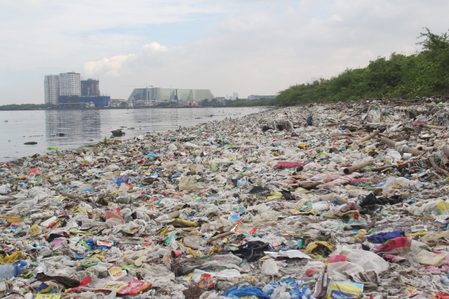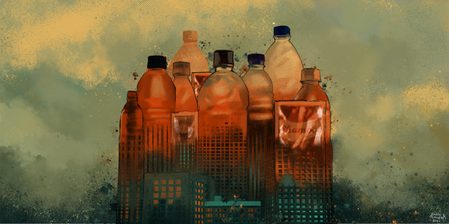SUMMARY
This is AI generated summarization, which may have errors. For context, always refer to the full article.
![[OPINION] The ‘choice’ between paper or plastic is a false one](https://www.rappler.com/tachyon/2022/06/plastic-paper-third-door-June-23-2022.jpg)
In March, United Nations member states finally agreed to design an international, legally binding instrument to deal with the worsening and pervasive issue of plastic pollution. While much work still lies ahead to ensure the initiative’s integrity – especially in the face of those with vested interests in conventional plastics – the prospect of a strong global treaty on plastics pollution is excellent news for the world’s oceans, wildlife, and humanity.
In parallel, the International Panel on Climate Change’s most recent report in April emphasized that keeping forests standing is vital to meet the pivotal 1.5-degree climate target. Yet, at a time when we should be focused on stopping deforestation, companies are doing just the opposite in an effort to find a substitute for plastics: sourcing materials made from the world’s ancient and endangered forests.
Trading one environmental disaster will only exacerbate the loss of forest biodiversity. With three billion trees logged every year for packaging, we can no longer rely on last century’s refrain of “paper or plastic?” We must find a third pathway that shifts beyond extractive plastic and forest-based supply chains and will see us implement real systemic solutions to the problems before us.
An integrated approach to circularity that prioritizes smart design, reduces waste to a minimum, and uses low-carbon, non-toxic, regenerative materials and technologies is not only imperative or ideal – it is possible.
In fact, the world’s most innovative companies are already investing in circular solutions, from low-impact multi-use alternatives to carbon-neutral product delivery systems. One global retailer has redesigned its single-use “warehouse to store” shipping box so that it can be used six times before the box is recycled. In doing so, the company now uses 83% fewer resources to ship products to stores, saving millions of dollars every year.
Likewise at the consumer level, an increasing number of businesses are starting to pursue zero-waste, non-toxic circular economy models by eliminating single-use products altogether and opting for reuse solutions, services, and products, including refill services for beverages, food, and cleaning products.
Cosmetics companies have already made great strides in this area. Beauty retailer Lush was an early adopter of a refill program with its “Pot Return” program, while Beauty Kitchen, a sustainable beauty company, recently partnered with Unilever to launch a “Return.Refill.Repeat” concept across the UK that enables customers to refill stainless steel bottles for several personal care products. These kinds of programs not only often encourage customers to participate via financial incentives but result in long-term cost savings for brands by reducing packaging needs.
Of course, we can’t eliminate packaging from our lives altogether. But we do have the ability to invest in alternative materials by utilizing lower-carbon Next Gen sources like agricultural residues (e.g. straw left from food production and soil needs), non-edible food waste, and even leaves, among many others. These inputs, generally burned or landfilled, are already available in scalable quantities. In India alone, 90-million tons of agricultural residue are burned every year, creating a health and pollution crisis that could be averted by low-impact packaging.
While recycling plays an important role in conserving finite resources, when it comes to most plastics, recycling does not necessarily equate to a truly safe circular economy, especially when one considers the toxic additives extensively used in various plastic packaging applications.
The age of single-use items that are used once and then discarded needs to end – regardless of whether they are plastic or paper. Our planet simply can’t afford it.
The “choice” between paper versus plastic is a false one. We don’t have to choose between polluting our oceans or razing the rainforest. Now is the time to develop, invest in, and scale truly circular solutions – many of which are right before us – by kicking open door number three. – Rappler.com
Von Hernandez is a leading Filipino environmental activist who has been campaigning on waste issues for more than 20 years. A Goldman Prize awardee, he is the global coordinator of Break Free from Plastic, consisting of more than 2,500 groups , representing millions of supporters worldwide that have come together to reverse the plastic pollution crisis.
Nicole Rycroft is the Founder and Executive Director of award winning environmental not-for-profit, Canopy – an organization that works with over 750 brand partners to transform their supply chains away from forests. Nicole is an Ashoka Fellow, winner of the 2020 Climate Breakthrough Award, and a recipient of the Meritorious Service Cross of Canada.
Add a comment
How does this make you feel?


There are no comments yet. Add your comment to start the conversation.